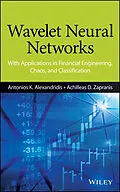A step-by-step introduction to modeling, training, and
forecasting using wavelet networks
Wavelet Neural Networks: With Applications in Financial
Engineering, Chaos, and Classification presents the statistical
model identification framework that is needed to successfully apply
wavelet networks as well as extensive comparisons of alternate
methods. Providing a concise and rigorous treatment for
constructing optimal wavelet networks, the book links mathematical
aspects of wavelet network construction to statistical modeling and
forecasting applications in areas such as finance, chaos, and
classification.
The authors ensure that readers obtain a complete understanding
of model identification by providing in-depth coverage of both
model selection and variable significance testing. Featuring an
accessible approach with introductory coverage of the basic
principles of wavelet analysis, Wavelet Neural Networks: With
Applications in Financial Engineering, Chaos, and
Classification also includes:
* Methods that can be easily implemented or adapted by
researchers, academics, and professionals in identification and
modeling for complex nonlinear systems and artificial
intelligence
* Multiple examples and thoroughly explained procedures
with numerous applications ranging from financial modeling and
financial engineering, time series prediction and construction of
confidence and prediction intervals, and classification and chaotic
time series prediction
* An extensive introduction to neural networks that begins
with regression models and builds to more complex frameworks
* Coverage of both the variable selection algorithm and
the model selection algorithm for wavelet networks in addition to
methods for constructing confidence and prediction intervals
Ideal as a textbook for MBA and graduate-level courses in
applied neural network modeling, artificial intelligence, advanced
data analysis, time series, and forecasting in financial
engineering, the book is also useful as a supplement for courses in
informatics, identification and modeling for complex nonlinear
systems, and computational finance. In addition, the book serves as
a valuable reference for researchers and practitioners in the
fields of mathematical modeling, engineering, artificial
intelligence, decision science, neural networks, and finance and
economics.
Autorentext
Antonios K. Alexandridis, PhD, is Lecturer of Finance in
the School of Mathematics, Statistics, and Actuarial Science at the
University of Kent. Dr. Alexandridis' research interests
include financial derivative modeling, pricing and forecasting,
machine learning, and neural and wavelet networks.
Achilleas D. Zapranis, PhD, is Associate Professor in the
Department of Finance and Accounting at the University of
Macedonia, where he is also Vice Rector of Economic Planning and
Development. In addition, Dr. Zapranis is a member of the Board of
Directors of Thessaloniki's Innovation Zone.
Zusammenfassung
A step-by-step introduction to modeling, training, and forecasting using wavelet networks
Wavelet Neural Networks: With Applications in Financial Engineering, Chaos, and Classification presents the statistical model identification framework that is needed to successfully apply wavelet networks as well as extensive comparisons of alternate methods. Providing a concise and rigorous treatment for constructing optimal wavelet networks, the book links mathematical aspects of wavelet network construction to statistical modeling and forecasting applications in areas such as finance, chaos, and classification.
The authors ensure that readers obtain a complete understanding of model identification by providing in-depth coverage of both model selection and variable significance testing. Featuring an accessible approach with introductory coverage of the basic principles of wavelet analysis, Wavelet Neural Networks: With Applications in Financial Engineering, Chaos, and Classification also includes:
• Methods that can be easily implemented or adapted by researchers, academics, and professionals in identification and modeling for complex nonlinear systems and artificial intelligence
• Multiple examples and thoroughly explained procedures with numerous applications ranging from financial modeling and financial engineering, time series prediction and construction of confidence and prediction intervals, and classification and chaotic time series prediction
• An extensive introduction to neural networks that begins with regression models and builds to more complex frameworks
• Coverage of both the variable selection algorithm and the model selection algorithm for wavelet networks in addition to methods for constructing confidence and prediction intervals
Ideal as a textbook for MBA and graduate-level courses in applied neural network modeling, artificial intelligence, advanced data analysis, time series, and forecasting in financial engineering, the book is also useful as a supplement for courses in informatics, identification and modeling for complex nonlinear systems, and computational finance. In addition, the book serves as a valuable reference for researchers and practitioners in the fields of mathematical modeling, engineering, artificial intelligence, decision science, neural networks, and finance and economics.
Inhalt
Preface xiii
1 Machine Learning and Financial Engineering 1
Financial Engineering 2
Financial Engineering and Related Research Areas 3
Functions of Financial Engineering 5
Applications of Machine Learning in Finance 6
From Neural to Wavelet Networks 8
Wavelet Analysis 8
Extending the Fourier Transform: The Wavelet Analysis Paradigm 10
Neural Networks 17
Wavelet Neural Networks 19
Applications of Wavelet Neural Networks in Financial Engineering, Chaos, and Classification 21
Building Wavelet Networks 23
Variable Selection 23
Model Selection 24
Model Adequacy Testing 25
Book Outline 25
References 27
2 Neural Networks 35
Parallel Processing 36
Processing Units 37
Activation Status and Activation Rules 37
Connectivity Model 39
Perceptron 41
The Approximation Theorem 42
The Delta Rule 42
Backpropagation Neural Networks 44
Multilayer Feedforward Networks 44
The Generalized Delta Rule 45
Backpropagation in Practice 49
Training with Backpropagation 51
Network Paralysis 54
Local Minima 54
Nonunique Solutions 56
Configuration Reference 56
Conclusions 59
References 59
3 Wavelet Neural Networks 61
Wavelet Neural Networks for Multivariate Process Modeling 62
Structure of a Wavelet Neural Network 62
Initialization of the Parameters of the Wavelet Network 64
Training a Wavelet Network with Backpropagation 69
Stopping Conditions for Training 72
Evaluating the Initialization Methods 73
Conclusions 77
References 78
4 Model Selection: Selecting the Architecture of the Network 81
The Usual Practice 82
Early Stopping 82
Regularization 83
Pruning 84
Minimum Prediction Risk 86
Estimating the Prediction Risk Using Information Criteria 87
Estimating the Prediction Risk Using Sampling Techniques 89
Bootstrapping 91
Cross-Validation 94
Model Selection Without Training 95
Evaluating the Model Selection Algorithm 97
Case 1: Sinusoid and Noise with Decreasing Variance 98
Case 2: …
